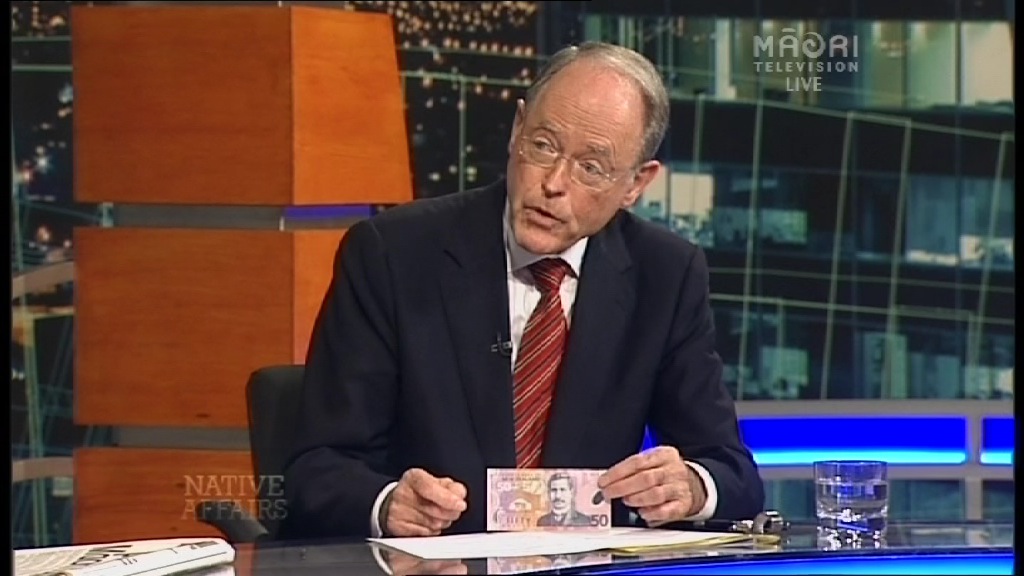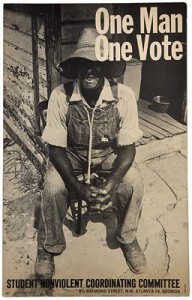Tonight’s Native Affairs debate between Pita Sharples and Don Brash is now up on their website, and it is must-watch television for a few reasons. The first and most immediately evident is Julian Wilcox’s quality as an interviewer and moderator — this was not a structured debate, with time allotted and mechanical switches between speakers, nor preset, pre-scripted questions. It was a free-flowing affair, with Wilcox acting as both interviewer and moderator; and throughout the two speakers were respectful, genuine, and both had ample opportunity to get their points across. It was superbly done. (Hone Harawira, in a later discussion, twice jokingly invited Wilcox to stand for Te Mana, but for mine he’s too valuable in the media.)
Another reason it was remarkable was because of Don Brash’s bizarre, out-of-touch equation of sentimental or cultural attachment to natural features — maunga, awa, moana and so on — with “animism”. It’s a perverse position to take, given the deep connection New Zealanders — both MÄori and PÄkehÄ — have to their landscape, about which I’ve written before. Imagine, if you will, a series of billboards featuring Aoraki Mt Cook, the Waitemata Harbour or Rangitoto, the Waikato or the Whanganui, Wakatipu, Taupo, or my own ‘home’ mountain of Taranaki — with the legend “Brash thinks this is just a lot of water”, or “Brash thinks this is just a rock”. If ACT were politically relevant, it might be worth doing.
Cash Rules Everything Around Me
C.R.E.A.M, get the money
Dollar dollar bill y’all
— Wu-Tang Clan
Like the gangstas of Staten Island legend, this sense that only what’s literal and material matters, that when push comes to shove, money trumps everything is integral to the faux-rational actor model to which ACT subscribes, and this leads into the major thing which made this interview important:
(Image snapped by Michael John Oliver, via twitter, thanks!)
And a brief transcript:
Brash: “Pita, I put …”
Sharples: “No, you didn’t.”
Brash: …”Apirana ta…Ngata on …”
Sharples: “The country put that on. Let’s be clear about that.”
Brash: “I made the decision. I made the decision, as governor. And I put him on that because I think he’s one of the greatest ever New Zealanders.”
Don Brash, the archetypal white rich guy, brought along a fifty dollar note — a note that many poor MÄori voters rarely even see — to a debate that was substantively about the reasons why MÄori are politically, socially, and economically deprived.
To appeal to Sir Apirana Ngata in a newspaper advertisement — as Brash did this weekend — is merely crass. To bring that actual visage in as a prop in an argument to dismantle the Aotearoa that Ngata and others had worked to build — that, as Sharples said, Ngata was criticised for being a “radical” by rich white guys like Don Brash — and seeking to imprint his divisive and offensive policies with Ngata’s mana is offensive to the man’s memory. To seek to take personal credit for Ngata’s mana being properly recognised — “I made the decision” — is obscene. To play a statesman’s memory like a chip on a weak hand at the last-chance saloon is no sort of respect. It is the ultimate “I’m not racist” gambit — “look, some of my best banknotes have Maaris on”. I wonder if he would treat the memory of Sir Edmund Hillary or Kate Sheppard in this way. Distancing himself from John Ansell’s misogyny by saying “hey, I put a broad on the $10” would be a thing to see. He had a decent crack at “I’m not racist, my wife’s from Singapore” back in the day.
Don Brash, during his brief run in politics, accumulated a series of bad images — “poor optics” as the lingo goes. Walking the plank, struggling to climb into the racing car, scooping mud out of his mouth at Waitangi, and so on. This image — of Brash big-noting to MÄoridom, if you’ll excuse the phrase; showing them who’s got the Benjamins, or the Apis — should be one of the enduring memories of the campaign. Brash probably thinks it’s a smart symbolic play, but it calls to mind a bunch of things he doesn’t want to call to peoples’ minds — his own wealth, the extent to which he’s economically out of touch with those he claims to want to represent, and perhaps most of all an almost unspeakably flawed sense of political and historical reverence, which places him out of touch at a deeper level; a level of shared sentiment and aspiration, of common culture and values.
In television, the rule is: don’t tell, show. No matter how often he tells Aotearoa that he shares our views and aspirations, we won’t believe it unless he shows us. Since storming the lofty heights of the ACT party Brash is busily telling us that what we stand for what he stands for, despite 98.3% of the evidence contradicting that assertion. And now he’s showing us exactly the same.
L




